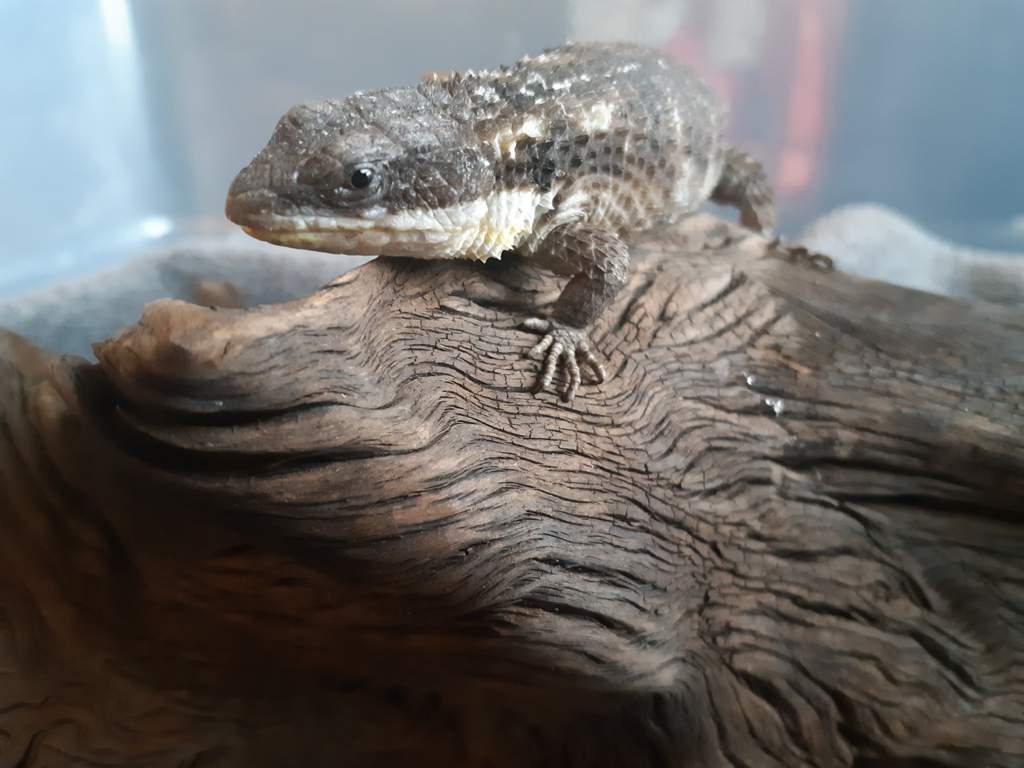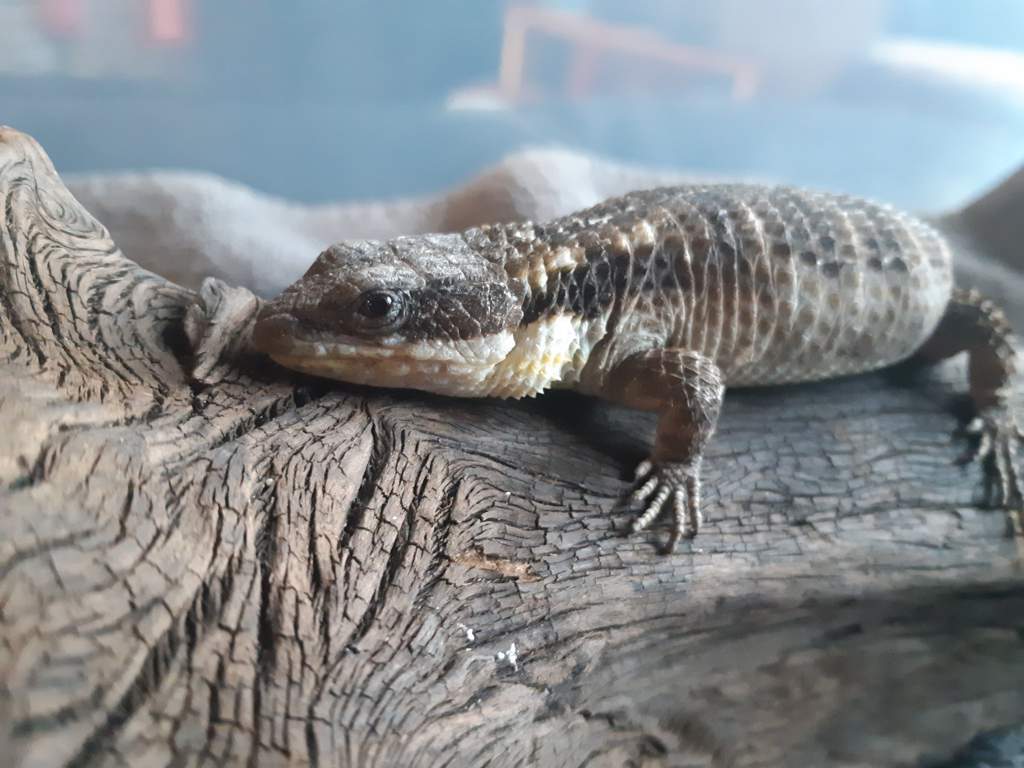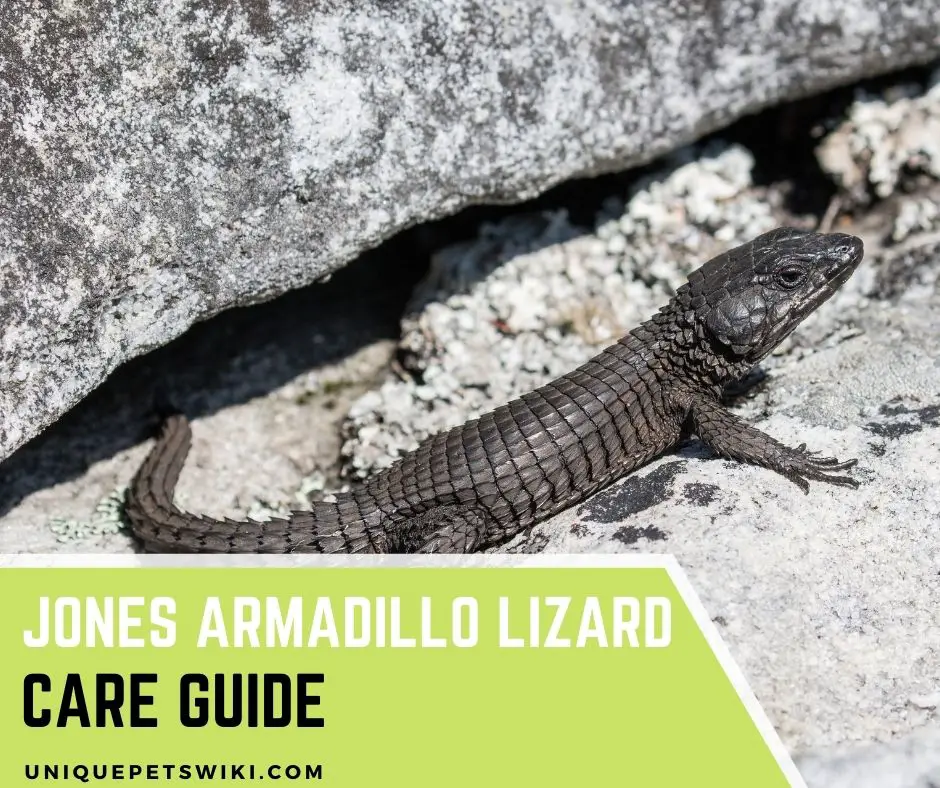Jones armadillo lizard is also known as Limpopo girdled lizard and Jones’ girdled lizard.
Because they were first discovered in a national park in Limpopo, Mozambique, they were named Limpopo girdled lizard. Furthermore, they belong to the Cordylidae family and are endemic to Southern Africa.
Although Jones armadillo lizards are not commonly kept as a pet, they are a perfect reptile for beginner hobbyists.
This is because it is quite easy to maintain and care for them once you keep them in a suitable habitat with proper environmental conditions.
In this article, we will highlight everything that you need to know about the Jones armadillo lizard from what is Jones armadillo lizard to how to care for them.
Contents
What Is A Jones Armadillo Lizard?

Jones Armadillo lizards are also known as Limpopo girdled lizards as they were first discovered in a national park in Limpopo, Mozambique.
They were once a subspecies of dwarf Girdled armadillo lizard (Cordylus tropidosternum).
However, they later gained their own species status and are known as Cordylus jonesii.
Although jones armadillo lizards are not a popular reptile kept as a pet, they are a perfect reptile for beginner hobbyists.
Jones Armadillo Lizard Habitat
Jones armadillo lizards do not need a gigantic cage because they are a small-sized lizard and can only grow to around 6 inches in length.
You can keep a single Jones armadillo lizard in a 10-gallon tank.
Mixed-Sex Habitat
You can keep a mixed-sex pair or trio in an enclosure with 2-4 square feet of space. Furthermore, you can use a 20-gallon tank if your lizard is more than one.
Jones armadillo lizards are social species in the wild. However, it is best not to keep more than a male in the same enclosure because they can become aggressive to each other.
Moreover, they cannot run away from aggressive co-species in captivity unlike in the wild.
You should also use a secure screened lid for keeping your lizards from escaping from their enclosure.
Substrate and Furnishings
Jones armadillo lizards originate from a relatively arid environment which means you need to provide them with a dry substrate like sand. However, it is best to keep an area in their cage damp to aid their shedding.
Furthermore, Jones armadillo lizards are considered to be partially arboreal in the wild and you may find them hiding under tree bark. In captivity, you will need to include accessories in their enclosure suitable for climbing.
It is also recommended that there is a secure hiding place in their enclosure where they can easily hide.
Heating and Lighting
Jones armadillo lizards require a temperature range of 75-85oF during the day and 70-78oF at night. They also need a basking area with a temperature of 90oF. You can easily provide the proper temperature by placing a heat lamp at one part of their enclosure.
You can then use a digital thermometer to ensure the temperature range is accurate. Furthermore, you need to provide Jones armadillo lizards with a full-spectrum bulb to help give them the necessary ultraviolet radiation needed for their health.
However, ensure the lights are on only for about 12 hours each day while you just turn them off at night.
Jones Armadillo Lizard Size
Jones armadillo lizards are considered to be a small-sized reptile. This means they can grow to a maximum size of about 4-6 inches in length.
Jones Armadillo Lizard Lifespan
Jones armadillo lizard can live for about 8-12 years in captivity.
Care For Jones Armadillo Lizard

In this section, we will discuss everything that you need to know about caring for Jones armadillo lizards.
Food
You should only feed juvenile jones armadillo lizards with bugs. Although it is recommended that you give them greens, they will not eat them. However, this helps to get them used to seeing greens in their food bowl.
Adult Jones armadillo lizards in the wild sometimes eat greens. You can then offer around 30% of their diet green in captivity. This helps to give them brighter colors, get more active and even increase their lifespan. Some of the foods that you can feed your Jones armadillo lizards are stated below.
Insects
- Roaches like dubia roaches
- Waxworms
- Super worms
- Silkworms
Greens
- Turnips
- Collard greens
- Dandelions
- Watercress
- Squash
- Carrots
- Peas
Foods To Avoid
You should avoid feeding your Jones armadillo lizards with any that can lead to metabolic bone disease like
- Cabbage
- Broccoli
- Kale
- Chard
- Spinach
- Parsley
Although you should avoid feeding your lizard with mealworms, it can still be fed to your lizard occasionally. This is because the shell of a mealworm can lead to impaction.
You should only feed fruit to your lizard occasionally.
You should also avoid feeding your Jones armadillo lizards with anything that has little nutritional value like cucumber, iceberg lettuce, corn, radish, etc.

Water Bowl
It is recommended that you provide your Jones armadillo lizards with dechlorinated water. However, the water must not be more than the reptile’s shoulders. You can easily reduce the depth of a bowl with large gravel that your lizard cannot eat.
Handling and Temperament
Most hatchlings and juvenile Jones armadillo lizards are usually squirmy and can bite you during handling. However, with regular handling, they will become more docile and you can handle them all you want.
Furthermore, Jones armadillo lizards can move very fast and you should avoid leaving them on the ground if you are not confident that you can catch them.
You also need to be wary of their mouth as they give warnings when they are about to bite by ridging their tail and slightly opening their mouth.
Furthermore, their bite can hurt and bruise your skin. You should also avoid picking a Jones armadillo lizard by the tail as they can drop their tail.
Furthermore, it is recommended that you only handle them when necessary because they can drop their tail when they are stressed.
Cost
Jones Armadillo Lizard can cost over $1000 according to their gender, size, and beauty. The main reason why they are quite expensive is that they are rare lizard species and do not breed in large numbers.
Cost For Cage Setup
As stated in the sections above, setting up a tank for Jones armadillo lizards is quite easy. You can easily get a 30-gallon glass tank for about $200 and buy an under-the-tank heating system for around $20.
Note: the prices of the cage may vary based on your location and where you buy your supplies, but you can still get one at a bargain price.
Cost For Food
You will be surprised to find out it is quite easy and cheap to care for Jones armadillo lizard. You can easily feed them with crickets that have all that they need in a healthy diet. The best thing is that you can buy a pack of 50 crickets for $2.
Cost For Cohabitation
When setting a pair of Jones armadillo lizards in your tank, you may need to budget about $2000-$2200. This is because you will need to buy additional accessories for the two lizards.
Medical Costs For Armadillo Lizard
Generally, you can budget about $10-$15 for the monthly health insurance of your lizard. However, you can spend about $80-$100 for a proper vet visit based on your region.
Where To Buy Jones Armadillo Lizard?
In this section, we will highlight some of the places where you can buy a Jones armadillo lizard.
Pet Stores
Because of their exotic look, most Jones armadillo lizards sold in pet shops around Europe and North America are usually sourced from the wild. This is why it can be quite hard to find them in regular pet shops. Before you can get one, be ready to do a lot of research.
Breeders
Generally, Jones armadillo lizards are a hard reptile species to breed. This is because they are among the few reptiles that lay eggs as the female gives birth to 1-2 babies alive in the winter. However, there are some great breeders like Reptile City and Backwater Reptiles where you can get one.
Classified Ads/Facebook Groups
You will find several groups on Facebook or classified ads where you can buy Jones armadillo lizard. However, the availability and shipping can be quite hard because of the sanctions placed on the export of this lizard.
Reptile Rescues
Because the population of armadillo lizards is diminishing, there are certain organizations that are working to help flatten this curve. Some of the popular names creating awareness and raising the issue at global forums are Sanbi Organization and CapeNature Conservation Services.
If you are lucky, you may be able to get a rescued Jones armadillo lizard from them.

I just aquired a male jonesii and a trio of females which I hope to breed. Currently they are being housed all together in a 40 breeder that is 18″ x 24″ giving them 6 SQ. Ft floor space. There’s no signs of aggression noted so far although the male seems to hog the prime basking area and UVB light. I realize that breeding such a small colony, even if successful, will do very little to remove any pressure on wild population collection, but every little bit helps in my opinion. Perhaps I should consider holding back any offspring and try to maintain several breeding colonies. They seem to enjoy discoid roaches and are capable of handling even roaches a little too large than recommended in that their strong jaws are more than capable of cutting larger roaches in half making them manageable. In addition they are taking crickets and occasionally mealworms, and I’m trying to breed two additional smaller varieties of roach to vary their died more. My research into the nutritional composition of roaches has taught me that not all roaches have equivalent nutritional values, so a variety of roach species, especially of different genera, is helpful from providing a varied diet.